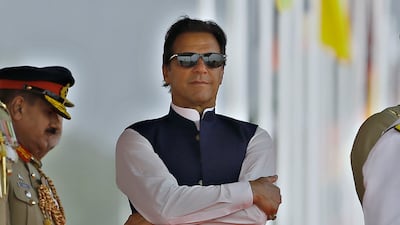Pakistan's opposition has asked the Supreme Court to stop Prime Minister Imran Khan carrying out a “coup” after he dissolved parliament and called fresh elections.
The nation's leading judges began hearings to adjudicate on a constitutional crisis that has left the world's fifth most populous nation in political turmoil.
The former cricketer on Sunday sidestepped a no-confidence vote after the national assembly's deputy speaker, a close political ally of Mr Khan, unexpectedly dismissed the motion.
Mr Khan's opponents claim he is guilty of treason for breaking the constitution and want the court back to reinstate parliament and the vote. Mr Khan had been widely predicted to lose, triggering an end to his leadership.
Bilawal Bhutto-Zardari, chairman of the Pakistan People’s Party, used a press conference in Islamabad to call on the judiciary to “stop Imran Khan's coup”.
"Your decision will write the future of the country. It will decide whether our constitution is just a piece of paper or a document that protects the integrity of the Islamic Republic of Pakistan," he said.
With the country's national assembly dissolved, Mr Khan's government has said there will be elections within 90 days.
President Arif Alvi on Monday asked Mr Khan and the opposition leader Shehbaz Sharif, of the Pakistan Muslim League (Nawaz), to suggest who might be the caretaker prime minister who, under the constitution, will now steer the country to the elections.
Mr Khan nominated Gulzar Ahmed, a former chief justice. Mr Sharif was reported to have so far refused to suggest a name.
The opposition's hopes that the Supreme Court might issue a speedy ruling were frustrated on Monday afternoon.
Farooq Naek, representing the joint opposition, asked the court to issue a verdict on the same day, pointing out that preparations were already being made for a caretaker prime minister. The opposition fears that the longer the court takes, the more difficult it will be to reverse what happened.
But Justice Ijazul Ahsan said such a fast ruling was impossible and noted that the court's decision would have far-reaching consequences.
"We can't pass a decision in the air," said Chief Justice Umar Ata Bandial. The hearing was adjourned until Tuesday.
The court must decide among other things if the Deputy Speaker Qasim Khan Suri had the authority to throw out the no-confidence motion.
But it will also have to judge whether it can even rule on the tussle, with some legal experts suggesting the court is forbidden from questioning parliamentary proceedings.
If the speaker rules that the deputy speaker was in the wrong, then parliament could reconvene and hold the no-confidence vote after all. If Mr Khan then loses, as predicted, the opposition would have the chance to choose a replacement, with Mr Sharif the most likely choice.
If the court instead upholds the latest actions, Pakistan will head to early elections.
There are also opposition fears that the longer the deadlock drags on, the more likely the military will be to somehow intervene.
















